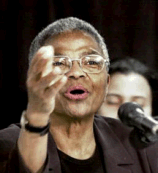|
|

Image source: African American Registry |
|
|
|
|

Image source: African American Registry |
|
|
|
|
|
|
|
|
|
To reflect on this July Fourth, I draw from the 19th-century
African-American abolitionist Frederick Douglass, who turned out to be
a bad choice for a speaker at an 1852 Independence Day celebration in Rochester,
N.Y.
Click here to get the full article---> http://www.progressive.org/mpber699.htm
The Irony of Bush v. Gore The United States Supreme Court decision resolving the
2000 election in favor of George W. Bush has been praised and derided by
commentators. Those who—believing that the Florida Supreme Court was culpable
and that Albert Gore Jr. was trying to steal the election—wanted the Court
to stop the recount may be pleased. A report commissioned by the television
network CNN concluded that CNN itself was partly responsible for the impression
that Gore was a culprit by the way it presented the election.1 Those who
believe that they were disenfranchised and that Bush stole the election
using five justices appointed during the Reagan and George Bush administrations
may still be displeased.
Click here to get the full article---> http://www.historycooperative.org/journals/jah/88.2/berry.html
TESTIMONY BEFORE THE U.S. CONGRESS The Civil Rights Commission has, in fact, supported ERA.
We supported the amendment as necessary for women under our jurisdiction
that we got over sex discrimination first in 1972, the year ERA was passed,
and we have repeatedly affirmed our support for the amendment.
Source: Congress, House, Committee on the Judiciary, Equal Rights Amendment: Hearings before the Subcommittee on Civil and Constitutional Rights of the Committee on the Judiciary, House of Representatives, 98th Cong., 1st sess. on H.J. Res. 1, July 13, September 14, October 20, 26, and November 3, 1983, Serial No. 115 (Washington: U.S. Government Printing Office, 1990). Click here to get the full testimony--> http://historymatters.gmu.edu/d/7023/
|
|
|
|
by Judith Haney
When Mary Frances Berry
was asked recently about whether the United States Commission on Civil
Rights (USCRC) had outlived its usefulness and mandate, she answered this
way:
Click here to get the full article---> http://www.usnewslink.com/maryfrancesberry.htm
Berry Urges Blacks to Continue Reparations Movement By Hermione Malone
Reparations are part of the unfinished business of the
civil rights movement, said Mary Frances Berry, guest lecturer in the first
installment of Beach Institute's 2002 series on reparations.
Click here to get the full article---> http://www.savannahnow.com/stories/032202/LOCReparations.shtml
News Staff Reporter The Buffalo News 10/7/2005 Mary Frances Berry, the noted author, University of Pennsylvania history professor and former chairwoman of the U.S. Commission on Civil Rights, brought her "labor of love" to downtown Buffalo on Thursday. Fresh off last month's publishing of her latest book, "My Face Is Black Is True: Callie House and the Struggle for Ex-Slave Reparations," Berry, along with five other distinguished African-American professors, held a two-hour panel discussion of her work at the Hyatt Regency Buffalo. The hotel is serving as host to the 90th annual convention of the Association for the Study of African-American Life and History through Sunday. Berry's book details the life of Callie House, a little-known but important leader in the struggle for civil rights in the late 19th and early 20th centuries. House, who lived from 1861 to 1928, was born into slavery and went on to found the National Ex-Slave Mutual Relief, Bounty and Pension Association, which campaigned for federal pensions to be provided for ex-slaves as compensation for their unpaid slave labor. House was eventually convicted of mail fraud when her grass-roots organization grew larger and attracted the ire of government and post office officials who looked to stifle the movement, professors said. Click here to get the full article---> More |
| This page and all related materials at this site compiled
and arranged by
|
END OF PAGE